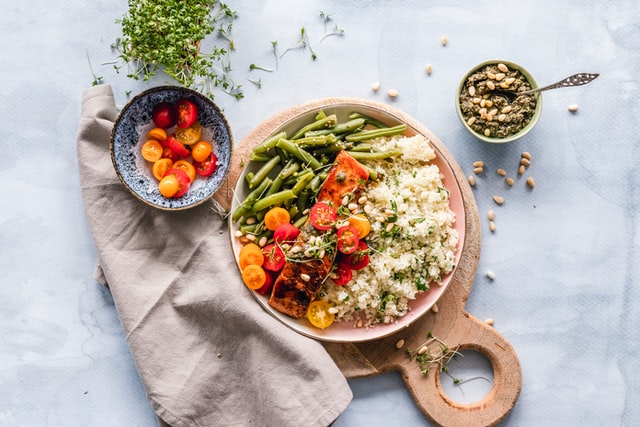
Our skin reflects our diet almost immediately. If we consume fatty, sugary, and processed foods, our skin is likely to react by becoming inflamed, puffy and rough in texture. What we eat directly affects the appearance of our complexion and determines how we age.
To maintain youthful, glowing skin, it’s important we nourish it from the inside as well as the outside. A well balanced diet containing protein, healthy fats, and good carbohydrates such as fresh fruit and vegetables will ensure beautiful skin, and help to slow the ageing process.
Water is the most vital part of your diet as it is vital to help flush out toxins and keep skin clear and hydrated.
For dry skin, load up on Omega-3’s. These essential fatty acids (EFA’s) are necessary for healthy, supple skin and help to repair the protective barrier that keeps moisture locked in. The most potent plant-based source of Omega-3 is chia seeds, with more Omega-3 than flax seed or wild Alaskan salmon.
For blemish-prone skin, a diet rich in greens, including watercress, spinach, broccoli, kale, spinach,and apples. The Vitamin A in these leafy greens helps normalise the production of oil, while the quercetin in green apples helps reduce mast cell activity, which leads to inflammation and breakouts. Sweet potato, carrots, egg yolks, dried apricots and tomatoes are also rich in vitamin A.
These foods are also good for sensitive skin, as is yogurt, a superfood loaded with probiotics and lactic acid to help soothe and calm redness and inflammation.
It’s imperative to load up on antioxidants to maintain youthful, supple and radiant skin. Acai, blueberries and spices such as turmeric, cinnamon and ginger are all wonderful sources of antioxidants that help maintain healthy skin. These foods fight free-radical damage that leads to fine lines, wrinkles, dullness, sagging and lacklustre skin.
Protein is made up of amino acids that are the building blocks cells use to repair themselves. Healthy fats, especially Omega-3 fatty acids and monounsaturated fat, have powerful anti-inflammatory effects improving skin’s moistness, texture, suppleness and smoothness.
Fresh fruit and vegetables. These contain antioxidants that stave off free radicals, the aggressive molecules produced by a diet rich in sugars and starchy foods, as a byproduct of your metabolism or the environment. Free radicals create inflammation that damages your cells, resulting in inflexibility, wrinkles, sagging and the loss of firmness, tone, radiance, and texture in the skin.
Superfoods
- Wild Salmon. This is probably the world’s most heart healthy source of protein. It is rich in long-chain Omega-3 essential fatty acids—the most beneficial kind—which protect heart health, inhibit inflammation, act as natural anti-depressants, increase feelings of well-being, and help keep skin young, supple and radiant.
- This is one of the richest sources of rutin, a bioflavanoid which strengthens small capillaries in the skin and may help prevent broken capillaries. It also contains glutathione—an abundant and essential tripeptide antioxidant found within the cells that plays a huge role in the cell’s ability to fight free-radical damage. Glutathione is our primary antioxidant defense and an effective suppressor of free radical damage.
- Dark Leafy Greens These are rich in the antioxidant plant pigments known as carotenoids, which enhance immune response, protect skin cells against UV radiation, and “spare” liver enzymes that neutralise carcinogens and other toxins. Their important antioxidant, anti-inflammatory effects reduce the risk of heart disease and block sunlight-induced inflammation in the skin—which leads to wrinkles and skin cancer.
- Extra Virgin Olive Oil.This is rich in oleic acid, which is a super emollient. The essential fatty acids present in olive oil nourish the skin and provide anti-inflammatory activity. The polyphenols that are found abundantly in olive oil are extremely efficient and multi-faceted antioxidants. Polyphenols are exceptionally stable and protective. The most powerful member of the Olive Oil Polyphenol group is Hydroxytyrosol. Extremely rare, and effective in even small concentrations, this super antioxidant, anti-inflammatory has been proven to be effective in improving general health and appearance.
- Pinot Noir. This is a delightful wine to accompany foods like salmon because pinot noirs have enough acidity in them to mitigate the fatty content. Red wine contains a powerful heart-healthy, anti-cancer, anti-aging antioxidant called resveratrol. It also appears that resveratrol helps protect the skin against the sun’s UV radiation. It appears that drinking wine—particularly red wines such as Pinot Noir—interferes with the production of a body chemical vital to the process that leads to clogged arteries and an increased risk of heart attack. White and rose wine do not offer the same protection.
Photo by Ella Olsson on Unsplash
